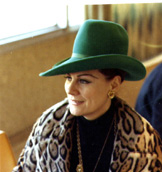Renata Tebaldi (Pesaro, Italy, February 1, 1922 – San Marino, December 19, 2004) by Joseph So
/ May 14, 2005
Version française...
 To opera fans
of a certain age, the passing of Renata Tebaldi represents the end of an era.
Often referred to as the greatest Italian prima donna of the last half century,
Tebaldi made her debut as Elena in Boito’s Mefistofele in 1944, and bid
farewell to the operatic stage in three Met performances of Otello in
January, 1973. She then embarked on a series of recitals, eventually drawing
her career to a close with an American farewell recital on February 19, 1976,
at Carnegie Hall, followed by a recital on the stage of La Scala shortly
thereafter. To opera fans
of a certain age, the passing of Renata Tebaldi represents the end of an era.
Often referred to as the greatest Italian prima donna of the last half century,
Tebaldi made her debut as Elena in Boito’s Mefistofele in 1944, and bid
farewell to the operatic stage in three Met performances of Otello in
January, 1973. She then embarked on a series of recitals, eventually drawing
her career to a close with an American farewell recital on February 19, 1976,
at Carnegie Hall, followed by a recital on the stage of La Scala shortly
thereafter.
Tebaldi was
celebrated for her beautiful voice, her sincerity of expression and direct
communication, and her warm and generous personality both onstage and off. My
very first live opera experience involved Tebaldi snging La Gioconda,
one of her signature roles, at the Met. I was hooked for life! In its prime,
her voice was an exceptional instrument that enveloped you in its voluminous,
velvety sound. One marvelled at her seamless legato, affecting portamento and
lovely mezza voce. She made her dramatic points onstage through sincerity of
conviction rather than by means of artifice. It is for this reason that Tebaldi
had the longest string of sold-out performances of her generation at the Met –
two hundred and sixty-seven performances in seventeen seasons.
Her hold on
the public remained undiminished long after her retirement, as is testified by
her return to New York in December 1995, after an absence of nineteen year.
Thousands of well-wishers lined up patiently to greet her, in a line that
extended from the concourse level of the Metropolitan Opera House, up and out
onto the Lincoln Center Plaza, and as far as the sixty-sixth street subway
station. Originally scheduled to sign autographs for 90 minutes starting in the
early afternoon, she was overwhelmed by the reception and stayed well into the
evening until she had greeted every fan. By the end, she was quoted as saying,
“I am tired, but happy!” The next evening, she was the guest at a Met
performance of Un ballo in maschera, where she was greeted with waves of
ovations, and with an enthusiasm greater than that received by the artists
onstage.
Throughout her
career, Tebaldi was billed as Maria Callas’s rival, a scenario not so much real
as manufactured by agents and record executives. The two ladies had completely
different voices and their repertoires rarely overlapped. While Callas reigned
supreme at La Scala throughout most of the fifties, Tebaldi was the darling of
the Met. In a career as long as hers, there were bound to be ups and downs.
After the death of her mother, Tebaldi reached an emotional low point that
affected her voice and culminated in 1962 in a vocal crisis. A hiatus from the
stage and a reworking of her technique allowed her to resume her career in
early 1964, albeit with somewhat diminished vocal powers. Nonetheless, her
return delighted devoted fans. ‘Renata is back’. A Tebaldi evening at the opera
was always festive, and her triumphs were greeted with vociferous applause. On
evenings when the bloom of youth deserted her, the audience suffered
respectufully alongside the singer. When I first heard her in 1967, the famed
Tebaldi sound, especially the top register, was not quite what it had been. The
middle voice however, was as gorgeous as ever, and her personal magnetism
remained unimpaired.
Rather
conservative artistically, Tebaldi avoided venturing outside her core
repertoire of Italian operas by Verdi, Puccini, and several verismo composers.
Only early in her career did Handel, Mozart and Wagner figure importantly. She
also avoided singing in foreign languages – her Eva, Elsa and Elizabeth were
sung in Italian. She turned down Tatiana at the Met because she didn’t feel
comfortable singing in English; and according to Decca executive Terry McEwen,
Francis Poulenc wrote the role of Madame Lidoine in Les Dialogues des Carmélites
with her voice in mind. Perhaps the greatest missed opportunity was a rumoured
Sieglinde opposite the Brünnhilde of Callas.
Tebaldi spent
her retirement years quietly and with dignity, occasionally teaching
masterclasses and receiving the many tributes with grace. One of these was a
Tebaldi rose dedicated to her by the French. Many of her admirers would call
unfailingly every year on her birthday. Tebaldi spent part of the year at her
summer home in San Marino, and would return to her apartment in Milan during
the opera season. She always expressed a certain satisfaction knowing that
young people who never heard her sing were now discovering her voice. Indeed,
it is through the medium of recordings and films that the art of Tebaldi lives
on.
Version française... |
|


